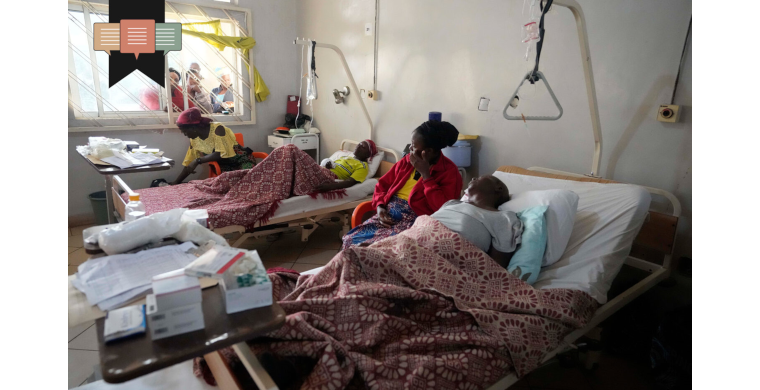The tragedy of the Nigerian Christian massacre
The Christmas attacks by Muslims are based in Islamic teachings
Victims of the attack in north central Nigeria receive treatment at Jos University Teaching hospital in Jos, Nigeria, on Dec. 27.Associated Press/Photo by Sunday Alamba
By Amos Luka
WORLD
January 2, 2024
The ranking of Nigeria as perhaps the most dangerous and deadliest country for Christians is not mere speculation. Nigerian Christians recorded several massacres at the hands of Islamists like Boko Haram and Fulani Herdsmen. Although the religious situation in Nigeria has political nuance, the truth about Islam and Muslims is not far from the teachings of their books and the example of their prophet. Politically, the Nigerian government and certain media outlets and newspapers coated Islamism with banditry and simple "farmers-herders clash." Religiously, Nigerian Christians and other Muslims are very aware of Islamism in the Nigerian context and see Islamists as the foremost perpetrators of the massacre in the Christian communities.
The recent Christmas attack on Christians in Plateau State of Northern Nigeria is the continuation of the massacre of Christians by Islamists, instigated by and some clerics. A recent report found more than 200 Christians were massacred, over 300 wounded, and over 10,000 displaced and made homeless in the attack. The sporadic attack targeted about 20 Christian villages in the Plateau on the night of Christmas Eve through the early morning of Christmas Day. The affected Christian communities and neighboring communities were left in a terrifying state of sorrow, instead of joyously celebrating the birth of Jesus as the Savior of the World. The Western Journal report acknowledges that a radical Islamic terrorist group masterminded the massacre of men, women, and children. The nature of the attack and massacre is not new to Christians in Nigeria. The attack resembles the practices of Boko Haram.
The hatred of Christians is a practical application of Qur'an 5:51, which says, "Believers! Do not take the Jews and the Christians for your allies. They are the allies of each other. And among you, he who takes them for allies shall be regarded as one of them. Allah does not guide the wrong-doers." The message of the text was amplified by some Islamic clerics in Northern Nigeria during this Christmas season. Sheikh Bello Aliyu Yabo, in his Hausa message on Facebook, says Nigerian Muslims should not identify with Christians' Christmas celebration. The message instructs Nigerian Muslims not to say "Merry Christmas" to any Christian and not to accept any Christmas gift from them. Therefore, saying "Merry Christmas" to a Christian is forbidden (Haram).
The recent Christmas attack could be perceived as the resurgence of Boko Haram's method of attacks on Christians and churches on Christmas Day.
Again, a BBC report reveals that in Northeastern Nigeria, Boko Haram invaded Christian villages on Christmas Eve, killed Christians, and burnt down a church. The villages are in Borno State, the home state of Muhammad Yusuf (1970--2009), who founded Boko Haram. Christian villages in that region of Nigeria suffered great persecution by Boko Haram. The BBC Report indicates that the villages are "close to Chibok where 200 schoolgirls were kidnapped in 2014," and a Christian lady, Leah Sharibu, from that village, is still in captivity by Boko Haram.
The attack on Christians on Christmas days by Islamists in Nigeria is not a new phenomenon. Boko Haram coordinated several attacks on churches on Christmas Day in Abuja, Plateau, and Yobe states. The African Union held a meeting on Dec. 26, 2011, in Addis Ababa and strongly condemned Boko Haram's bombings on Christmas Day in Nigeria. The chairperson of the Commission, Jean Ping, rejected acts of terror and cruelty perpetrated by Boko Haram. The report in 2011 revealed that the bomb attack on St. Theresa Catholic Church in Madalla, Abuja, claimed over 39 people and left about 60 with serious injuries. Another suicide bomb attack in Damaturu, Yobe, claimed over 60 people, and a gun battle between police and the attackers of Mountain of Fire Church in Jos, Plateau state, claimed the lives of other Christians. Boko Haram also claimed a bomb blast on Christmas Eve in 2010 in the city of Jos. Hence, the recent Christmas attack could be perceived as the resurgence of Boko Haram's method of attacks on Christians and churches on Christmas Day.
One may wonder why Boko Haram is attacking Christians on Christmas Day. The attack of Christians on their special and most important festival is an indication of the rejection of Christianity in Nigeria. The Islamists are being faithful to the teachings of their books and leaders. Boko Haram is against befriending or tolerating Christians. They want Nigeria to be free from any form of non-Islamic innovation and come under the complete rule of Islamic law. Yusuf declared war on Christians in Nigeria, especially the Middle Belt. The incessant attacks on churches and Christians in their communities, especially on Christmas day, is the continuation of the war declared by Yusuf and later echoed by Abubakar Shekau.
Amos Luka is a doctoral student at The Southern Baptist Theological Seminary.
VOL COMMENTS: Many killed were Anglicans














